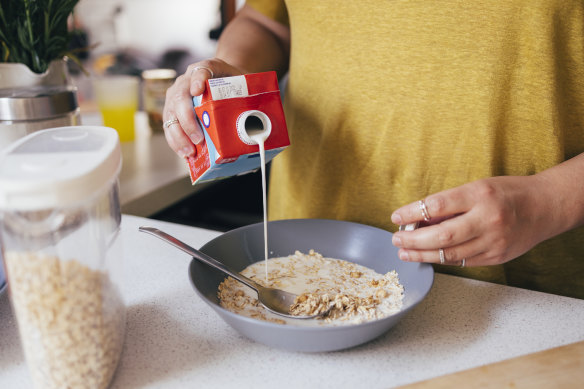It’s the favourite food of the greatest marathon runner of all time, Eliud Kipchoge, who ate it for breakfast the morning he became the first man to run 42.2 kilometres in less than two hours.
Kipchoge is not the only elite athlete who uses oats to help power their performance and there is evidence hunter-gatherers were making porridge 30,000 years ago. But you’d be forgiven for thinking oats are the epitome of stodge, not the breakfast of champions.
Experts say oats are an excellent addition to a diverse diet.Credit: iStock
The latest sport on social media – typically played by those spruiking the ketogenic or carnivore diet while sunning their perineum – is to sledge the humble team player that is oats.
The claims doing the rounds allege that the purpose of oats is to make horses fat for the winter; that they contain avenin, a protein which supposedly increases inflammatory molecules called cytokines; that studies suggesting oats improve cholesterol or blood glucose are flawed because they are being compared with control groups who consume white bread; that they are full of phytates, compounds which bind to zinc, iron and calcium preventing their absorption, and lectins, another apparently pesky protein (found in a wide array of plant foods) that can poke holes in the lining of our gut; and finally, that they contain high levels of pesticide residues.
So what is it? Are oats nutritional rocket fuel or are they, as one cardiologist-turned-nutritional quackologist and social media star put it, “one of the worst foods you can put in your body”?
CSIRO Agriculture and Food deputy director (Impact) Michelle Colgrave says there will always be contrary opinions, but the greatest body of evidence suggests oats are an excellent addition to a diverse diet.
Colgrave, also an Edith Cowan University professor, says the soluble fibre oats contain binds to cholesterol and removes it from the body, while the insoluble fibre supports digestion.
Oats also have unique antioxidants and – compared with other grains – are high in protein and healthy fats, which make them particularly filling. They are more resistant to pests than many other grains too, so require less treatment.
“I would say the idea that they are higher in residual pesticides is a falsity,” Colgrave says.
Some of her research has looked at whether avenin, which is sometimes compared to gluten, interacts with the body to trigger inflammation.
Minimally processed forms of oats, like steel-cut or rolled oats, retain more nutrients.Credit: iStock
“We found oats have a fewer number of epitopes – the triggers of coeliac disease – and they have less toxic forms and lesser amounts,” says Colgrave. “The growing consensus is oats can be consumed safely in a gluten-free diet.”
The caveats to this – for those with coeliac disease – is to make sure you buy wheat-free, pure or uncontaminated oats (not processed in a facility that also processes other gluten-containing grains) and to do it under your doctor’s guidance.
And although lectins and phytates are sometimes referred to as “anti-nutrients”, and in large quantities can be problematic for certain people, research suggests they have health benefits, too, including cancer-preventing properties.
“Diets that are rich in plant foods are inevitably shown to be beneficial,” says Dr Joanna McMillan, a nutrition scientist, dietitian and Scotswoman whose birthright is the defence of porridge. “If [phytates and lectins] were truly harmful, we wouldn’t see that association with plant-rich diets.”
That is not to say they are right for everyone or right in every form. “For some people who have particular sensitivities or gut problems, they may benefit from a lower lectin diet,” McMillan says.
The processing and preparation of oats affects how they are absorbed, too.
By soaking them overnight or cooking them, the amount of phytates and lectins they contain is dramatically reduced while the availability of their nutrients is improved.
Minimally processed forms of oats, like steel-cut (chopped whole grain) or rolled oats (steamed and pressed), retain more nutrients and are absorbed more slowly by the body, so they don’t spike our blood sugar as much as instant oats. They are also less likely to have additives thrown in.
And speaking of additives, mind the ingredients in your oat milk. Have it in your latte, but don’t expect it to have the nutritional profile of former premier Bob Carr’s beloved wild oats.
So, whether you’re an athlete, average Joe, paleo or politician, feel free to enjoy your porridge in peace. It was, after all, the dish upon which empires were built.
Make the most of your health, relationships, fitness and nutrition with our Live Well newsletter. Get it in your inbox every Monday.
